#subtexts in sherlock
Explore tagged Tumblr posts
Text
does anyone realize how crazy it is to have the actor of a mostly headcanoned queer ship say the fans were never crazy and they were right all along after 10+ years of everyone just absolutely going nuts over the said queerbaited ship
#supernatural#dean winchester#spn#destiel#castiel#deancas#misha collins#im 20 i have been Experiencing supernatural and johnlock since i was 12 and merthur since wayy before that i have fought Wars#this is crazy#i love u hannibal i love u 911 (if u make eddie gay)#for the love of god by 'mostly headcanoned' i dont mean that it was never intentional#i am aware that they put the subtext in on purpose#they knew what they were doing#but my focus here is on the actor actually saying it because like#if its not mostly headcanoned then y was the entire cast denying it for years AND YEARS#like do yall not remember what jared and jenesn used to say#there have been many many many instances where the cast has made us feel crazy/stupid for saying anything abt destiel#im just saying TO ME its crazy that actors and creators talk so openly about these things now !!! again i was raised on merlin and sherlock#ok also im confused on the queerbaiting part#everyones saying its queer coding and not queer baiting but cant they be true at the same time ?#im not being dumb on purpose i swear im just confused#like yes dean is very much bi coded and their relationship is queer coded but if the creators deny everything#and we only get a last minute confession after 11 years#that doesnt count as queer baiting ?#someone smart explain this to me 🙏
3K notes
·
View notes
Text
*me at the club* so does anyone wanna discuss queer undertones in classic literature?
#frankenstein#dracula#the great gatsby#moby dick#hamlet#jane eyre#twelth night#as you like it#the picture of dorian gray#mrs dalloway#the merchant of venice#calling some of these subtext feels derivative but tagging anyway#sherlock holmes#anna karenina#the strange case of dr jekyll and mr hyde#wuthering heights#little women#literature#classic literature#queer subtext#queer lit#lgbtq+
2K notes
·
View notes
Text

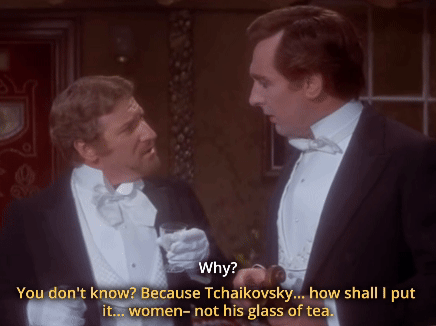
(Rogozhin tries to persuade Holmes to marry Madame Petrova)
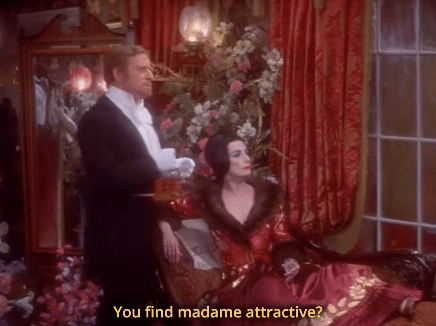

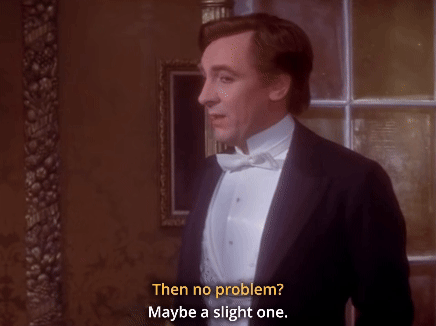





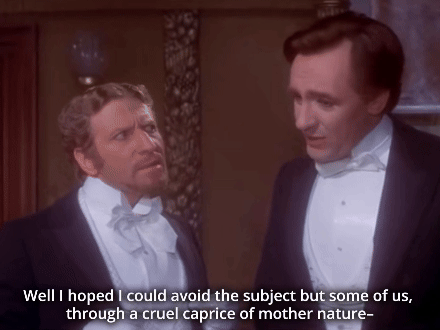
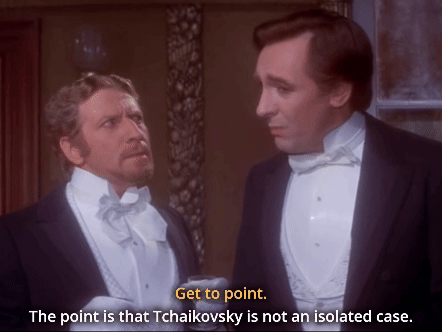


The Private Life of Sherlock Holmes (1970) dir. Billy Wilder
#we had canon gay sherlock holmes in barely-post-hays-code era hollywood. how we have regressed#I studied billy wilder in school cos he did some interesting queer stuff with 'some like it hot' and I remember reading that he snuck some#queer subtext into his sherlock holmes film. but this is not exactly 'subtext'#you could argue that he lied to get out of marrying her and sure he is lying about being in a relationship with john but not the rest of it#because he sure as hell isn't lying when he discusses it with watson later. maybe I'll gif that scene too#sherlock holmes#the private life of sherlock holmes#tplosh#johnlock#billy wilder
463 notes
·
View notes
Text
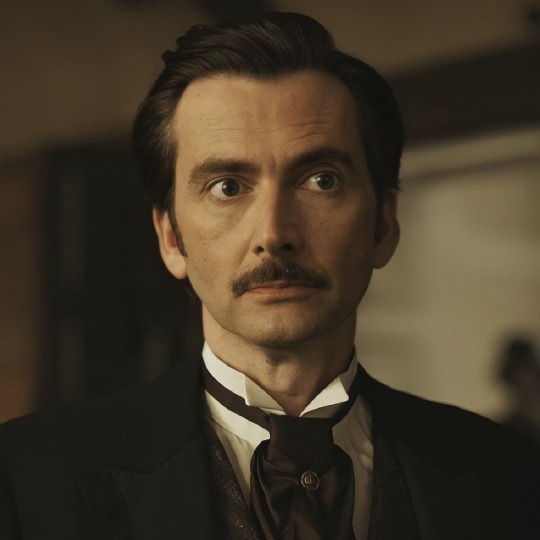



anyways. new personal holmes & watson ideal casting
#when I say ideal I mean I know david would play him slutty and michael would serve gay subtext#david tennant#michael sheen#david and michael#Sherlock Holmes#holmes x watson
2K notes
·
View notes
Text
MY PROF JUST REFERENCED JOHNLOCK IN 2024 JOHNLOCK NATION HAS NEVER BEEN MORE UP 🗣️🗣️🗣️
#johnlock#my rambles#specifically the bbc version which makes it even more insane#‘some interpret them as an epic bromance but once you get into the modern adaptations you’ll see their relationship through another lens’#OKAY.#understatement of the century#an entire generation of queers built one of the biggest tags on ao3 with the amount of queer subtext in these stories/episodes#bbc sherlock
111 notes
·
View notes
Text
Subtext in The Creeping Man
I find that this story of Arthur Conan Doyle's Holmes canon features some of the most complex subtext we've had aside from A Study in Scarlet. But rather than being complex early-on because of our lack of knowledge of the characters, it is rather complicated by the fact that we both know too much and too little of their relationship. This story, with astonishing subtlety, conveys the cooperative relationship between Doyle's two characters — the nuance in their limits and strains, but also the joys that they work to reach, together. It emblemises the beauty of the Canon, where it all ties back to the joy and complexity of human understanding and belonging.
This story opens in "those latter days" (1903, near to Holmes's retirement) where Watson describes their relations as "peculiar". The word certainly feels like a euphemism from the ever-polite Dr. Watson, when it is soon made clear that their relations were far from amenable. Watson has become one of Holmes's "concentrated habits", and apparently is as good as a piece of funiture, as all of Holmes's remarks would have been as "appropriately addressed to his bedstead." It's given through snapped sentences; "I was a whetstone for his mind. I stimulated him. He liked to think aloud in my presence." This "irritation" and discordance between them is extremely concentrated in the early pages of this story, but drags through it, as well. Take, for example, the "laconic" (or perhaps iconic?) message:
"COME AT ONCE IF CONVENIENT — IF INCONVENIENT COME ALL THE SAME. S.H."
Watson gives us the original of Holmes's telegram to demonstrate to his readers just how "long-suffering" he is. A true exhaustion is apparent in how he simply shows the telegram, rather than politely referring to it. Compare this with the unendingly civil telegram sent to Watson in The Boscombe Valley Mystery, and you can see the great shift that has taken place in their alliance.
"HAVE YOU A COUPLE OF DAYS TO SPARE? HAVE JUST BEEN WIRED FOR FROM THE WEST OF ENGLAND IN CONNECTION WITH BOSCOMBE VALLEY TRAGEDY. SHALL BE GLAD IF YOU WILL COME WITH ME. AIR AND SCENERY PERFECT. LEAVE PADDINGTON BY THE 11.15."
While long-term and intimate relationships will remove need for over-courtesey, there are two very different reasons for why Doyle has shown both of these telegrams at a point in time. This accumulation of Holmes's ungrateful behaviour not only imparts Watson's utter despondancy, but also, importantly, Holmes’s — and this is something that Watson's ever-perceptive and intelligent heart does not fail to miss. It is important to note that this story nears Holmes's retirement, where he acknowledges that he has been "sluggish in mind". There is no doubt, then, that the great detective is out of his prime. Hence the temperementalness, taking his Watson for granted, and a heavier reliance on those "narrow and concentrated habits."
Despite the turbulent roads of their life, we see Watson's undying devotion co-exist with it. Past all the irritation, Watson closes, "Such was my humble role in our alliance." It is more than clear that he consciously makes the decision to remain at Holmes's side, to be his ally. Such has always been Watson's role in their alliance. His "humble" service extends to his practice as doctor and soldier. His pride is in his duty to others, and to Holmes as his assistant.
There is something that shines through Holmes's unsocial behaviour when we look closely at the text.
I sank back in my chair in some disappointment. Was it for so trivial a question as this that I had been summoned from my work? Holmes glanced across at me. "The same old Watson!" said he. "You never learn that the gravest issues may depend upon the smallest things."
We know from the Canon (opening of DANC and RESI) that Watson's emotions are like an open book to Holmes. This 'sinking in some disappointment' is not missed by Holmes's 'glance'. "The same old Watson!" he says, and I feel it important to note that he compliments one of Watson's most distinguishing features; his stability and fixture — the "one fixed point in a changing age." Yet, we may miss these details, because Holmes, ever in his own insecurity, must back-hand every praise with a teasing chide. We could say that an attempt was made to cheer Watson up, though not very successful.
Developments continue, as Holmes tryingly says "I had hoped to have a longer chat with you", then parades him with compliments before their client, "Dr. Watson is the very soul of discretion". But mixed indications continue to come as he flips back to patronising language; "You will appreciate it, Watson, when"—. Doyle further cements Holmes's particular unbecoming behaviour on this day as he further also annoys their client, who speaks in a "tone of reproach" when Holmes does not listen, and is "clearly annoyed" at irrelevant interruptions — to which, Holmes only smiles in, what I believe, is pure self-importance.
Here we find a shift — a greater effort on Holmes's part, a second round of appreciation for Watson's stability, even when his opinion is faulty. "Good, Watson! You always keep us flat-footed on the ground". He's then included in his bubble; "We were gradually coming to that conclusion, were we not, Watson?", and even a sordid attempt at bringing Watson with him on the bait of the Chequers in 'Camford' where "the port used to be above mediocrity and the linen was above reproach." (Which he follows up on!)
And, despite these attempts, their connection still does not rekindle. Watson is clearly irritated still with the inconsiderate easiness with which Holmes was able to leave London, leaving only difficulty on Watson's end to join him. It's an indicator from Doyle that nothing's remedied, yet.
Here is an interesting passage for study.
"Have you the effrontery necessary to put it through?" "We can but try." "Excellent, Watson! Compound of the Busy Bee and Excelsior. We can but try — the motto of the firm."
Burstive praise from Holmes at the merest utterance of a phrase — a phrase which has only ever been used one other time in the Canon; the previous story, The Problem of Thor Bridge. This suggests it may be some small motto of Holmes's, though one not often seen in Watson's records — this makes his use of the phrase a very Holmesian approach. This participation, no doubt, is nothing but a delight for Holmes, who is trying to restring their relationship, and continues to overenthusiastically affirm Watson's sturdiness.
Yet it's made clear that superficial praises are not a true apology, as we see signs yet again of Watson's dispassion. As they sit to their meeting with Professor Presbury, Watson writes:
Mr. Holmes smiled amiably.
This sentence may seem unassuming, but be assured it is one of the coldest in the Canon. This usage of "Mr. Holmes" is entirely unique within the Canon. In other times, when Watson has used "Mr. Holmes" or "Mr. Sherlock Holmes", it has been when speaking directly to his readers, since they would be using the honourific. This moment is the only exception, where Watson has intentionally used "Mr." to create distance and convey undesire for intimacy with Holmes (rather than any professional effect). Why has Watson used the line here? Well, Holmes is 'smiling amiably' — in a way that forces a friendly manner, one that attempts to create a good impression with Professor Presbury — which also didn't work out, by the way. Considering all the superficial means up to now employed by Holmes on his companion, Watson no doubt feels cheapened and no more important than Holmes's investigative objects; as if his trust is just as easy to gain as anyone else's, with nothing but an 'amiable smile'.
We are shown time and again that Watson isn't pleased with Holmes's desultory attempts at reconciliation, until finally, a shift happens. One that is not identifiable in the text, and so is reasonable to assume happened unpenned. We find Holmes acknowledging that "Dr. Watson has his patients to attend to", when before this information seemed completely irrelevant to him. Holmes even sent Watson a "short note asking [him] to meet at the train"! The greatest change is when we finally have Watson using "my friend" and "my comrade" for the first time in this story. Now we see Watson taking real excitement in the case, in the "assurance of [his] comrade". Self-teasing also makes its way into their dialogue as Holmes cries "Oh, Watson, Watson, what a fool I have been!" The emphasised address seems to suggest an apology for something more. It's as if he cries 'Look how wrong I have been Watson, how imperfect and daft I can be!' It's adorable, really.
All semblances of reproach towards Holmes disappear as they steal together in darkness, come to the dénoument of their adventure, as Holmes philosophises on science and nature, and described admiringly as "the man of action". Our story ends in a light-hearted resolution, as always.
"There is an early train to town, Watson, but I think we shall just have time for a cup of tea at the Chequers before we catch it."
To conclude, this story presents so much so subtly in its pages; a reflection of the small, nuanced and unseen processes between human beings, but those which we must be attentive to in order to find fuller understanding between each other. Yet, there is still much uncertainty in my inferences; which also shows the uncertainty of language and communication. We simply must be clear of ourselves, as we can only assume Holmes and Watson were, off-page, for them to have found that resolution, rather than fleeting smiles and compliments. Arthur Conan Doyle, with this story, further cements the triumph of bonds and connection, perhaps far more than any other of his stories.
#acd canon#sherlockian scholarship#sherlock holmes#acd holmes#classic literature#literature analysis#victorian husbands#fun fact I bummed out the LFW server with the “Mr. Holmes smiled amiably” line#was worried this was too long but I think all of this is necessary for my point#CREE is so underrated! I think it's brilliant for this reason#I don't actually care for the mystery. it's shit#the real mystery is whether Holmes and Watson actually made up while in Camford or not#ACD how are you so insanely good at subtext. you put so many treasures in the text for me to find and puzzle over. i love you#hashtag the indomitable human spirit#I could have also commented on some way more suggestive lines but they didn't feel relevant to this analysis#it doesn't actually matter if they're fucking or not sorry guys
102 notes
·
View notes
Text
Gay Easter Eggs in BBC Sherlock

(I trust the above requires no explanation.)
Perhaps someone has done this before, but I wanted to put together a compilation of gay easter eggs in the show that I’ve seen other people point out and/or have thoughts on myself. So here it is!
When I say “easter eggs,” I’m thinking of small clues that the show creators included in the set designs, music choices, and other details of the show to reference that Sherlock and John are in love. I’m thinking of things you could miss at first, especially little clues that often require a bit of extra information or require observations across episodes to understand.
Of course, there’s also lots of subtext woven into the show, moments where interpreting the dialogue or visuals in a certain way tells us something about Sherlock, John, and/or the state of their feelings for one another. I’m not sure if I can clearly define “subtext” versus “easter eggs” and explain what distinguishes them, but at least to me, several of the things I’ve listed here seem a bit different from what people often refer to as subtext. Maybe subtext is about uncovering the layers to a piece of dialogue or an action that takes place in plain sight and seeing how that impacts our interpretation of the story, but easter eggs are about spotting smaller, hidden details. I’m not trained in literary or film studies, though, and I’m not trying to be doctrinaire about this at all! This list is just for fun, anyway. (The above image might not actually count as an easter egg, but I couldn’t resist including it here. Indulge me.)
The more I read about this show and the harder I look, the more I think that hardly anything is there on accident. All these easter eggs must have been included on purpose. The creators knew they were telling a love story all along.
I’ve linked to the posts where I initially saw people point these out or to other good sources, and for some of these I’ve added my own commentary/observations/interpretations. I’m sure there are many other easter eggs that I’ve missed! What have you spotted?
John’s PIN in TBB – When John tries to pay for his groceries at the beginning of the episode, we see that his PIN is 743. In ASIB, Irene’s code to unlock her phone is SHER, which would be 7437 on a phone keypad. So, John’s PIN is a clue that he is or will be in love with Sherlock. Source: @loudest-subtext-in-tv, here.
Shaftesbury Avenue, 20m from Piccadilly Circus in TBB – While investigating in Chinatown, Sherlock and John bump into each other at what used to be a cruising spot for gay men in London. Source: @the-signs-of-two, here.
Archer the American in ASIB – In the scene where the American CIA agents try to get Sherlock to open Irene’s safe, the head CIA agent pressures Sherlock by threatening to have one of his men shoot John. The agent says: “Mr. Archer, on the count of three, shoot Dr. Watson.” Ordering someone named “Archer” to shoot John could be a reference to Arthur Conan Doyle’s poem “The Blind Archer,” which is about Cupid and describes Cupid shooting two men who sound an awful lot like Sherlock and John. Source: couldntpossiblycomment, here.
“¿Dónde Estás, Yolanda?” in TEH – The song that plays during the scene with John and Sherlock’s disastrous reunion at the Landmark restaurant is a cover of the song “¿Dónde Estás, Yolanda?” performed by the band Pink Martini. The Spanish lyrics to this song are about searching for a long-lost lover, which is fitting for the scene where John sees Sherlock again for the first time since his fall. Notably, the creators didn’t use the first of the two versions of this song that Pink Martini has released. The band’s first version appears on their 1997 studio album Sympathique and features a man singing about a woman. Instead of using that version, the creators used the version from Pink Martini’s 2011 compilation album A Retrospective, in which China Forbes performs most of the vocals. So, the creators deliberately chose a remade version of the song in which a woman sings about a woman. They chose a gay song about searching for a long-lost lover for Sherlock and John’s reunion. abrae (@tea-and-liminality on tumblr) has a meta with more to say about the use of this song here.
John’s “oscillation on the pavement” in TEH – In TSOT, John observes a potential client standing outside 221B and trying to make up her mind as to whether to come in. Sherlock tells John “I’ve seen those symptoms before. Oscillation on the pavement always means there’s a love affair.” In the previous episode, John came to visit Sherlock at 221B but hesitated on the pavement outside, staring at the door and trying to decide whether to go in. Sherlock’s comment, “I’ve seen those symptoms before,” is a hint that we, the audience, have also seen those symptoms before—with John in the previous episode. Source: @bidoctor, here. (I saw someone else point out that last part about Sherlock’s hint to the audience, but I can’t find that post, sorry!)
Lilac dresses in TSOT – While planning John and Mary’s wedding, Sherlock chooses lilac-colored dresses for the bridesmaids. When John tells Sherlock that he likes the bridesmaids in purple, Sherlock pointedly corrects him by stating that the dresses are lilac. Apparently, “In Victorian times, giving a lilac meant that the giver is trying to remind the receiver of a first love.” So by dressing the bridesmaids in lilac, Sherlock is trying to remind John of his first love: himself, Sherlock. My heart breaks. Source: @asherlockstudy, here.
Putting the horns on Mary and Janine in TSOT and HLV – In TSOT, there’s a shot where Mary gives Sherlock and John a thumbs up before they head out on a case. The way Mary is standing, the horns on Sherlock’s cow skull thing on the wall behind her are placed right over her head. (I always thought this shot looked pretty weird, but now I see that it must have been intentional!) In the HLV scene with Janine at 221B, there’s a moment when Janine steps in front of John in the frame to kiss Sherlock, and her movement positions the horns right over her head. “Putting the horns” on someone means cheating on them. So in both cases, placing the horns right above Mary’s and Janine’s heads indicates to the audience that Sherlock and John are the real relationship in this show. Source: this post from multiple users on the @sherlockmeta blog.
The architecture of Sherlock’s mind palace in HLV – In the mind palace scene after Mary shoots Sherlock, the architecture of Sherlock’s mind palace is based on locations from ASIP. Sherlock literally built his mind palace out of places from his first case with John, illustrating that his relationship with John is what grounds him and that it means everything to him. abrae has some very helpful screencaps of this here (and I would recommend that whole meta, btw!)
The glasshouse scene in TAB – In TAB, the Victorian John tries to ask Sherlock about his sexuality and sexual history while they’re sitting in a glasshouse. In Victorian Britain, “glasshouse” was another term for a military prison. So John, a military veteran, asks Sherlock about his sexuality in a setting that represents where he would have been sent if he had acted upon his homosexual desires at a time when homosexuality was criminalized. Source: @haffieliesel, here.
What do we say about coincidences? The universe is rarely so lazy.
#johnlock#bbc sherlock#sherlock#tjlc#meta#gay easter eggs#subtext#sherlock x john#sherlock holmes#john watson#mary morstan#janine#janine hawkins#irene adler#tbb#asib#teh#tsot#hlv#tab#the blind banker#a scandal in belgravia#the empty hearse#the sign of three#his last vow#the abominable bride#the universe is rarely so lazy
113 notes
·
View notes
Text

Watson is such a pick-me girly, as soon as Holmes doesn't pay attention to him, he gets depressed.
71 notes
·
View notes
Text
the narrative of kaveh being an idiot is so baffling to me because he is, quite literally, canonically considered a genius…? why is the popular consensus “6000 IQ alhaitham and his lovably stupid roommate kaveh” when every npc commenting on kaveh refers to his intellect & talent, the literal god of wisdom says kaveh has an “almost-perfect grasp of what it truly means for sumeru to be a nation of wisdom” (whereas she questions alhaitham’s wisdom in her line about him), and alhaitham’s own story profile calls kaveh a genius multiple times??? like the whole point is that he’s alhaitham’s intellectual equal despite having entirely separate worldviews and demeanors, which frustrates alhaitham to no end — ‘how can someone so smart do all of these things that, to me, are so evidently stupid?’ the takeaway from their dynamic should NOT be kaveh is dumb, but rather that empathy and emotion aren’t actually the opposites of logic and intelligence, but sadly both alhaitham and the realm of academia as a whole are too blinded by their own definitions of logic to fully realize that.
tl;dr kaveh is not dumb by any standards and i will prove it
(under the cut: quotes/screenshots/etc proving this + more. please spread the gospel and dispel ignorance. amen)
some npc voicelines (there are more but i’m lazy):


these are pretty self-explanatory — kaveh is a widely-renowned scholar, architect, and engineer throughout sumeru. he graduated from the akademiya with flying colors, students were desperate to take his classes, etc.
nahida’s voicelines:
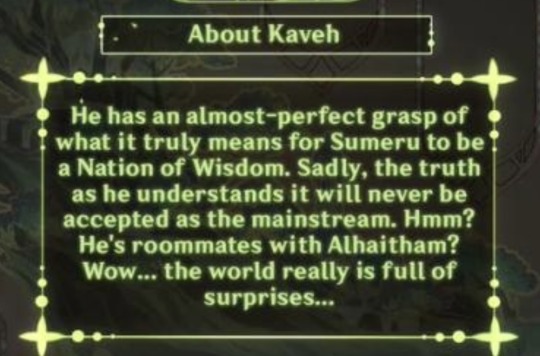
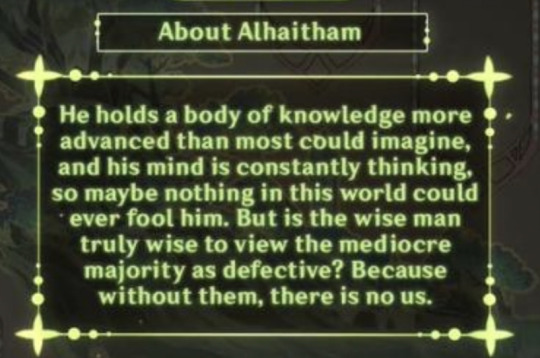
both are intelligent but only one is wise: kaveh. alhaitham is too restricted by his narrow definition of wisdom (read: what he deems ‘logical’) to look beyond himself and grasp that there’s more to intellect and knowledge than pure cold rationality. he can’t comprehend that empathy and intellect aren’t fundamentally incompatible — in fact, they’re best when put hand in hand. kaveh is one of the few scholars capable of valuing emotions, empathy, and artistic endeavors, while the rest of the akademiya closes themselves off to that entire realm of knowledge from the get-go. this is what makes kaveh uniquely wise, and what alhaitham lacks. until you understand that emotions and logic can and should coexist, you won’t be successful in the true pursuit of knowledge.
last but not least:
alhaitham’s profile (worth noting that profile stories are pretty much the most reliable source of information on characters’ true beliefs and opinions — their voicelines are still them putting on acts in front of the traveler, but these stories are told from the perspective of an omniscient narrator and are likely closer to the truth):

“two geniuses.” and even after their falling out, “neither of them will deny the other party’s exceptional brilliance” — meaning alhaitham considers kaveh to be exceptionally brilliant. point blank. in the text bro

hilarious line — it’s basically alhaitham saying he doesn’t understand how someone with kaveh’s talent and intellect could have a personality/worldview so different from haitham’s. ‘how can someone that smart be so annoying!!!!!’ and ofc by values we know it’s referring to kaveh’s idealism, empathy, and affinity for the arts

alhaitham considers kaveh to be “another genius,” someone who is so much his intellectual equal that he’s “an excellent mirror” for alhaitham. it’s like an experiment for him — the initial question is “how can someone as smart as me care about all of these things i’ve always believed to be worthless,” the subjects are kaveh and alhaitham, the controlled variable is their intellect. because their intellect is the same, alhaitham is able to study their differences (can’t attribute said differences to varying intellect). alhaitham would never say it out loud — and luckily he doesn’t need to bc his character story tells us — but he’s deeply fascinated by kaveh bc kaveh’s very existence is a threat to haitham’s worldview, & he’s letting kaveh stay with him bc through kaveh, alhaitham learns about not just himself but the outside world and humanity as a whole, and as a scholar, there’s nothing more valuable. (also because he feels comfortable with kaveh [“he’s a familiar face”] and they’re both lonely [“similarly lacks familial attachments”] lol these two are never beating the We Know You Don’t Actually Hate Each Other allegations but that’s a different point so i digress)
IN CONCLUSION:
this is all just the TEXTUAL evidence — people saying “kaveh is smart” — and doesn’t even include all of the obvious implicit signs of kaveh’s intellect (no one who graduates from the akademiya w honors and teaches classes there could be anything other than incredibly intelligent, al “i don’t do anything that i don’t want to do” “i’m not going to bother explaining it to you because you won’t understand” haitham not only puts up with but actively seeks out debates with kaveh which he absolutely would not do if he didn’t respect him or consider him to be of roughly equal intellect, look at the debates he has w alhaitham on sumeru messageboards and TELL ME those messages sound like they were written by an idiot or itto or something [you cant], etc etc etc).
and also this is all from 3.3 (+ 3.4 alhaitham leaks)! we don’t even know kaveh’s rarity yet, that’s how far he is from being playable, but there’s already this much information on just how smart he is! it’s the main thing we know about him — 1) he’s smart, 2) he’s passionate/driven by what he feels is right! why does that keep turning into “LOL HOTHEADED HIMBO”??!
okay look. this is all so extra i know. BUT. i must set the record straight now (god knows it’ll only get worse the closer we get to kaveh’s release) because this sudden-onset mass illiteracy within genshin players is going to send me to an early grave. feel free to use as a resource and educate the ignorant so kaveh does not end up reduced to a one-note meme dumb guy when literally that’s just… not even in the game. i mean at least other annoying OOC fandom interpretations have basis in the game but genshin literally tells u every time it gets the opportunity that Kaveh Is Just As Smart As Alhaitham Because Cold Rationality Does Not Equal Wisdom/Intelligence and losing that would be such a crime because it is by far the most interesting n promising thing hoyo has done with new characters in ages! like, not only are they funny and entertaining, not only are they fascinating incredible foils for one another, but they’re used to make a much-needed argument against the prevalent hegemony of mindless rationality and our “logical” society’s illogical fear of emotion/empathy. but yeah sure, theyre just itto & ayato 2.0, i guess. god. the lack of reading comprehension among genshin players is literally an epidemic
#frustrating me to no end. miss the entire point of their dynamic and characters as a whole why don’t you#literally this isn’t ‘shipping goggles’ or anything it’s just … knowing how to read. not looking for subtext just literally reading the text#kaveh#genshin impact#genshin#genshin kaveh#genshin impact leaks#alhaitham#haikaveh#kavetham#kavehtham#genshin meta#i hope ppl see this bc it Needs To Be Said but sadly it will probably get like 10 notes. BUT STILL. i will try#fr the narrative needs to change i don’t think i can take five months of people on reddit characterizing him as th watson to hthm’s sherlock#yeah maybe if watson was a fucking genius too!!!#long post#(under the cut lol)#100#500
1K notes
·
View notes
Text
the rise of chappell roan and iwtv as overtly queer media i didn't have as a teen is making me feel things. back in my day we just had subtext for breakfast
52 notes
·
View notes
Text
Timeline of the relationship between Sherlock Holmes and John H. Watson!
*I had already posted this, but I deleted. I found new information as flipped through my books. So, sorry who had rebloged the previous post that I deleted, but I prefer to delete and rewrite CORRECTLY, ok?
1881 - Sherlock and Watson meet each other, through for Stamford. As per A Study in Scarlet.
1881 to 1886 - Both continue to live together in Baker Street.
1887- Watson tells us that will marry a woman, whose name he never tells us. As per, The Adventure of the Noble Bachelor
1887- Watson is married to a, no name, woman. Although his friendship with Sherlock remains and Watson even stays at Baker's when his wife is out of town. As per The Five Orange Pips.
March, 1888 - Watson remains married to an unnamed wife, according to A Scandal in Bohemia.
September, 1888 - Watson meets Mary Morstan, falls in love with and becomes engaged to her, as read in The Sign of the Four. There is no mention of what happened to the previous wife, apparently he didn't have any children either with her (I think it unlikely that she died, after all Watson never mourns her, and is soon engaged again without bereavement). It's almost as if this previous girl did NEVER exist.
1888 or 1889 or 1890??? - Watson married Mary, as read in The Adventure of the Stockbroker's Clerk. Watson says his marriage took him away from Holmes. But curiously there are some cases after his marriage where Watson is with Holmes and makes no mention of his wife (strange, isn't it?)
*that's confused me in the post I deleted, regarding the date of Watson's marriage to Mary.
Watson mentions one of his weddings being in the summer/spring and another in the fall/winter. But he does not deign to say in which he married Mary. Having met Mary in September, if he married her in the same year then it was autumn, but if he married her in summer then it is 1889.
Still, Watson says that his marriage and return to the medical profession took him away from the Holmes cases, however there are some cases where he seems to live on Baker Street in 1888 and 1889!! And this confused me earlier, whereupon I said that perhaps he was married in 1890, for how can he be married in 1888 or 1889 and also live with Holmes? Lmao.
Yes! It could just be Watson/Doyle being an unreliable narrator. But do you agree that it leaves room for doubts and assumptions/subtext?? correct?
1890 to 1891- The point is that Watson married Mary, because in The Red-Headed League, which takes place in 1890, he is married! Well, as he mentions his marriage in The Final Problem, allegedly stating that his marriage alienated him from Holmes, a case that takes place in 1891, where Holmes supposedly dies.
1894- Holmes resurfaces, and we are briefly informed that Watson's wife has died, apparently he had no children with Mary. So he returns to live with Holmes in Baker Street. As per The Adventure of the Empty House.
1895 - They aren't on Baker Street, aren' t in London, Watson refuses to say why. They weren't out on a case! (Coincidence or not, this was the year of Oscar Wilde's trial who, although married and with children, was condemned for his relationship with men). They are back in end of April and July in the The Adventure of the Solitary Cyclist case and The Adventure of Black Peter case. But travel to norway after that. Return to Baker in September, as seen in the case of the Bruce-Padington plans case.
1894 to 1901 - Time they lived together in Baker Street again. In that time, Watson stops practicing his profession and sells his medical clinic (at Holmes' request), Watson does nothing more than follow Holmes on cases and write them down, curiously Holmes keeps Watson's checkbooks with him (not there is no explanation why, although assumptions are made that Watson had problems with overspending or bet) and Watson helps Holmes get off drugs too! As per The Return of Sherlock Holmes book.
*p.s: in the year 1896 there are cases where Watson says he does not live in Baker Street, as for example in The Adventure of the Veiled Lodger. However, these cases ALWAYS have narrative inconsistencies. And to other cases in 1897 where he LIVES with Holmes, as per The Adventure of the Abbey Grange.
Yes, Watson/Doyle is a miserable and unreliable narrator because many cases have DATES or DATA and inconsistent FACTS that don't fit, so that it's impossible to organize the 60 cases in chronological order, there comes a point where we get out of accuracy and we have to start to ASSUME/suppose/imagine where some several cases take place. As someone who has tried to organize, believe me, it's a never-ending headache, which is why there are different lists of Timelines. So I'm ignoring Watson's inconsistencies as a narrator in order to claim that he lived with Holmes from 1894 to 1901, okay? I'm just putting here the dates given by Watson that don't have apparent contradictions.
1902 - Watson left Baker Street, for reasons he does not tell us. Claims to live on Queen Anne Street. Although he still takes part in Cases and Turkish Baths with Holmes, as per The Adventure of the Illustrious Client.
1903 - Last cases. Sherlock regrets that Watson has left him to marry a woman (another nameless wife of Watson), so the detective is left alone to investigate the cases. As per The Adventure of the Blanched Soldier. And Watson returns to practicing medicine with a good clientele as per The Adventure of the Creeping Man.
1907 - Holmes is retired. He lives with his bees and a housekeeper he doesn't talk to much. He gets along well with the director and teachers of a school close to his house, to the point of visits, walks and swimming on the beach. Sherlock says he sees Watson on weekends. As per The Adventure of the Lion's Mane.
1908 to 1913 - Watson claims he rarely sees Sherlock, because Holmes prefers to send short telegrams rather than letters. Watson continues to write old Holmes cases whenever Holmes lets him. As per The Adventure of the Devil's Foot (which takes place in 1897, but Watson does just tell us until after Holmes is retired).
1914 -The last appearance of both at Canon. Date of the First World War. Watson had not seen Holmes for about 2 or 3 years, he thought that Holmes had become a hermit with his bees. But Holmes was actually undercover as a spy for 2 years on matters involving the war. As per His Last Bow case.
P.s: In the post I deleted mentioned that Watson got married 3 times and claims to have experience with women on 3 different continents. While Sherlock says he has never loved, has no interest in women and has his body as an appendage and is against emotions that undermine his reason. What they both think in terms of homoaffective relationships cannot be exposed since it was a crime at the time. Watson explicitly exposes to the public a fact that he is Heterosexual while Holmes seems to fit in Asexuality. However, narrative inconsistencies, narrative omissions and errors leave gaps for subtexts. Watson also admits to omitting data and facts that could expose clients or Sherlock and himself. So this also adds assumptions for subtexts.
#sherlock holmes#dr john watson#sherlock x john#john watson x mary morstan#mary morstan#johnlock#arthur conan doyle#acd canon#assexual sherlock#gay subtext
239 notes
·
View notes
Text
I refuse to rewatch it but BBC Sherlock was probably the first time in my life I realized what queerbaiting really actually meant
#cringe sherlock vs based hobbit#queerbaiting vs subtext#qell subtext sure they literally have a spring wedding in the shire in lego hobbit and then skip around holding hands#theres a dedicated kiss button iirc
20 notes
·
View notes
Text


John, there's something I should say, I've meant to say always and I never have. Since it's unlikely we'll ever meet again, I might as well say it now
Sherlock S3 | Loki S2
#loki#loki season 2#loki x mobius#lokius#loki series#loki laufeyson#bbc sherlock#sherlock s3#john watson#sherlock holmes#tjlc#queerbaiting#queer#gay#gay subtext#mobius m mobius
87 notes
·
View notes
Text
Oscar Wilde trial in a nutshell
Oscar Wilde: Your..! *slams hand on the stand he's behind* Honour! I might be gay, but he..! *pointing at prosecutor* Is a furry!
Judge: ...
Judge: You're guilty.
#dark humour#bbc sherlock#sherlock fandom#johnlock#sherlock holmes#sherlockian#the johnlock conspiracy#tjlc#bbc sherlock subtext#tjlc is real#oscar wilde#1895#oscar wilde trial#victorian indecency trials#victorian sodomy laws#fucked up humour#sad humour#yikes#this is basically about how pompous Wilde supposedly was at the trial
28 notes
·
View notes
Text
baby gays will reblog six different pieces of art with "you construct intricate rituals to touch the skin of other men" plastered on them and turn around and get huffy when a show from the 2010s keeps its queer subtext subtextual and wrapped in violence
#like i don't know what to tell you man#for most of our history we've had to live in the realm of subtext for safety reasons#therefore a lot of the media that resonates with us reflects that#and can be affirming in its own way#not everyone has had the experience of coming out to acceptance and safety#ETA. NOT SHERLOCK. TRUE DETECTIVE.
28 notes
·
View notes
Text
“I am a bachelor,” said he, “and being of a sociable turn I cultivate a large number of friends. Among these are the family of a retired brewer called Melville, living at Albemarle Mansion, Kensington. It was at his table that I met some weeks ago a young fellow named Garcia. He was, I understood, of Spanish descent and connected in some way with the embassy. He spoke perfect English, was pleasing in his manners, and as good-looking a man as ever I saw in my life.”
“In some way we struck up quite a friendship, this young fellow and I. He seemed to take a fancy to me from the first, and within two days of our meeting he came to see me at Lee. One thing led to another, and it ended in his inviting me out to spend a few days at his house, Wisteria Lodge, between Esher and Oxshott.”
Mr. Eccles and Mr. Garcia meeting up for some gay sex. It’s not even subtle. ‘I am a bachelor’, ‘as good-looking a man as ever I saw’, ‘one thing led to another’... Sure, Doyle, you could not have made this any clearer
#letters from watson#sherlock holmes#the wisteria lodge#it's not even subtext anymore we STILL use this kind of language today#I'm perfectly sure few readers would have missed was doyle was implying here
71 notes
·
View notes